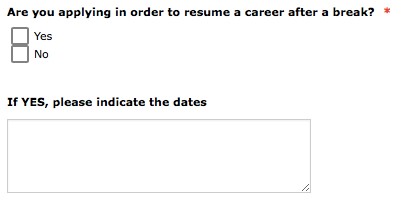|
|
FAQ
"Place of Activity/Residence" what does it mean?
The place of activity/ residence is the Country/place where the applicants carried out their main activity (work, studies, etc.). Compulsory national service and/or short stays such as holidays are not taken into account. In this section has to be indicated - in chronological order and without gaps - the country/place of activity of the applicants in the 3 years immediately prior the call deadline (short stays, e.g. holidays, are not taken into account). It is not sufficient for applicants to state the year (e.g., 2014), it is also important to give the specific date (e.g., 2 August, 2015
2 (ESR) Early Stage Researcher, what does it mean?ESRs - Early-stage researchers (PhD students) are those who are in the first four years (full-time equivalent) of their research careers and have not yet been awarded a doctoral degree. This is measured from the date when they obtained the MSc degree which formally entitles them to embark on a doctorate (as a PhD student). 3. "Research Experience" what does it mean?“Research experience” means any professional or academic research activity acquired in the public or private sector. Part-time research experience has to be counted pro-rata. At the time of the deadline for application (October, 24th 2016) the applicants have to be in the first 4 years (full-time equivalent research experience) of their research experience, measured from the date when they obtained the degree/diploma that entitles them to embark on doctoral studies without having to acquire any further qualifications. The four years mentioned above are calendrical years, not academic years. Thus, every month counts. 4. How to measure the full-time research experience (number of months)?
The number of months of full-time equivalent research experience have to be measured from the date when the applicants obtained the degree/diploma that entitles them to embark on doctoral studies without having to acquire any further qualifications. 5. "Career break" what does it mean?
The applicants have to specify if career breaks occurred for justified reasons, such as civil or military service, parenthood, or family care and/or unconventional research career paths. This information will be useful to calculate the effective months of full-time research experience. It is not sufficient for applicants to state the year (e.g., 2014), it is also important to give the specific date (e.g., 2 August, 2015).
6. "Family Obligations" what does it mean?“Family” is defined as persons linked to the researcher by marriage, or a relationship with equivalent status to a marriage recognised by the legislation of the country where this relationship was formalised; or as dependent children who are actually being maintained by the researcher. The family status of a researcher will be determined at the deadline of the call and will not be revised during the lifetime of the action. 7. “Certificated copy of University degree in Food or/and Health Science”. Which type of degree/diploma is required?The applicants have to upload a certificated copy of the University degree in Food or/and Health Science corresponding to the degree/diploma that entitles them to embark on doctoral studies without having to acquire any further qualifications (e.g. 2nd Level Master Degree (120 ECTS + 180 ECTS in a bachelor degree) or, in alternative, a single- cycle degree (minimum 300 ECTS), or a comparable University degree (second-cycle qualification) in Food or Life Sciences). |
Rep-Eat
H2020-MSCA-COFUND-2015
University of Teramo - Via Renato Balzarini 1
64100 - Teramo (TE) - Italy

REP_EAT MSCA Co-funding of regional, national and international programmes (COFUND) HORIZON 2020” – Grant Agreement N. 713714.CUP: C47B16000360007

 FAQ
FAQ

